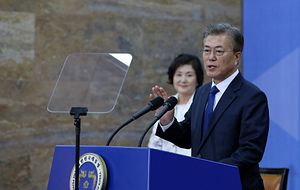The Moon administration has introduced a five-year roadmap on job creation that emphasizes creating jobs in the public and private sectors, while improving the overall quality of jobs. South Korean President Moon Jae-in held the third session of the Presidential Committee on Jobs and made the official announcement of the five-year plan on October 18.
The roadmap plans to create more than 810,000 jobs in the public sector. It will focus on recruiting 174,000 field agents in public security and social welfare, as well as creating 340,000 additional jobs in social services. In the latter case, it will start off by recruiting 170,000 personnel within this year in high demand areas such as child and elderly care, caretaking services for persons with disabilities, and healthcare. Another 170,000 jobs will be created in the cultural, sports, and environmental sectors afterwards.
The remaining 300,000 jobs will be created by transitioning temporary positions to full-time jobs, or bringing in more recruits for public firms. South Korea’s Ministry of Employment and Labor has announced on October 25 that 205,000 temporary job positions throughout 853 public agencies will be transitioned into full-time posts.
In the private sector, the roadmap seeks to induce more employment by providing support to “innovative startups” as well as stimulating the social economy. This is becoming an important issue since South Korea is seeing rapid increase in the number of one-man, self-employed startups that do little to create more jobs. To tackle this situation, the roadmap seeks to provide various incentives to build and expand “innovative startups” conducive to job creation.
One notable feature of such incentives is bringing in professors and researchers to join the startup race. The plan is to extend the maximum duration of leave if academics intend to open startups by the first half of next year. It will also be positively reflected in professors’ assessments as well as human resources’ (HR) assessments for researchers.
The roadmap is composed of ten focus areas that include establishing a governing system for jobs, strengthening the employment safety net and developing innovative human resources, creating 810,000 jobs in the public sector, promoting “innovative startups,” strengthening industrial competitiveness and fostering newly emerging industries and the service industry, stimulating the social economy, creating jobs in local communities, preventing the abuse of temporary positions and creating a non-discriminatory working environment, improving working conditions, and providing job opportunities suitable for young people, women, and incoming middle-age generations.
Many critics ask whether expanding the number of public servants or providing incentives to startups will be enough to resolve the unemployment issue in South Korea. They claim that the fundamental key to the solution lies with the conglomerates, pointing out that there are sectors with high demands for human resources within the conglomerates that the government is not paying full attention to. Lee Hyun-soon, CTO of Doosan Group, has said that the Group “has immediate demands for manpower, but it cannot locate the means to employ them.”
Critics suggest setting up better communication channels between the public and private sectors to allow for a more effective allocation and employment of human resources based on the needs of the conglomerates.
Moon also elaborated on the need to develop South Korea’s social economy as a solution to job creation as well as resolving economic polarization, emphasizing that “social economy is the alternative to what our economy is facing today: growth without employment and economic inequality.”
The Moon administration’s initiative on stimulating social economy was announced in a separate report alongside the roadmap. The report included points about the way ahead for ongoing legislative processes to renovate South Korea’s economic structure and plans to support social enterprises, such as cooperatives, in order to promote the culture of profit-sharing. It also seeks to provide incentives to start social businesses by obligating public agencies to consider social firms as their first option when purchasing goods and services.
The Presidential Committee on Jobs, responsible for delivering the five-year plan for job creation, is a product of Moon’s very first instruction after he took office on May 10 this year.

































